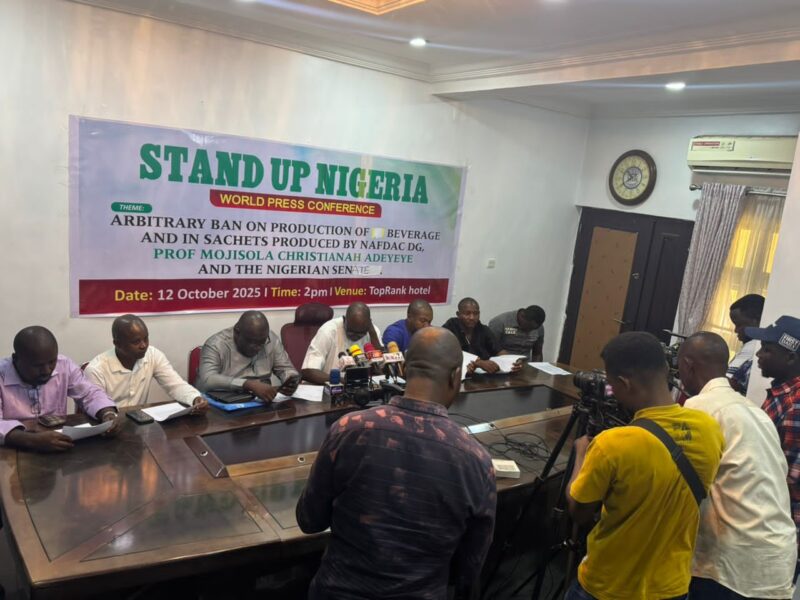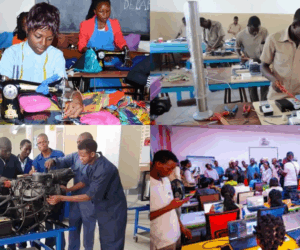Civil society group Stand Up Nigeria has criticised NAFDAC’s planned ban on sachet and small-bottle alcoholic drinks, calling it undemocratic and warning it could cost the economy trillions and millions of jobs.
PREMIUM TIMES reported that NAFDAC’s Director-General, Mojisola Adeyeye, said the decision followed a Senate directive instructing the agency to enforce the ban and entirely rule out further extensions.
The group condemned the planned ban at a Wednesday press conference at Toprank Hotel in Garki, Abuja.
Expressing deep concern and disappointment about the directive, the group convener, Sunday Attah, described it as “high-handedness and illegalities” allegedly perpetrated by Ms Adeyeye and her associates.
The group argued that the directive contradicts President Bola Tinubu’s Renewed Hope agenda, which they said “prioritises economic empowerment and the protection of local industries.”
They said: “We read with rude shock, a piece of news item in the print media, broadcast and other media outlets credited to the National Agency for Food and Drug Administration and Control (NAFDAC), purportedly placing a ban on the production, distribution and consumption of alcoholic beverages in sachets and small-volume PET/glass bottles (below 200ml) by December 2025.
“This draconic pronouncement by the director general, Prof. Mojisola Christianah Adeyeye, in collaboration with some members of the Nigerian Senate, is in sharp contrast to the renewed hope agenda of His Excellency, Asiwaju Bola Ahmed Tinubu GCFR. Who rose to power with a people-oriented development blueprint, immediately embarked on total diversification of the nation’s economy to make resources available for executing capital projects, as seen in the full deregulation of the Nigerian oil sector downstream.”
Undemocratic
The group described the anti-drug agency and Senate decision as hasty and undemocratic.
They noted that NAFDAC failed to engage critical stakeholders and industry players to reach a common ground, despite resolutions earlier adopted at a meeting with the Federal Ministry of Health and members of the House of Representatives.
Furthermore, the group expressed concern that the ban appeared to stem from alleged resolutions passed by the Senate, which it said “undermined due consultation and consensus-building.”
“An arm of government that is ordinarily supposed to represent the interests of all Nigerians, directing NAFDAC to enforce the illegal ban on December 31, 2025, without hearing from the second party. We strongly suspect that the alleged Senate resolutions were passed at the behest of NAFDAC, at its sitting on Thursday, November 6, 2025, without taking cognisance of the ongoing consideration of the same matter by members of the House of Representatives.
“Meanwhile, a directive for one-year extension by the Ministry of Health, a supervising organ of government that is constitutionally saddled with the responsibility of overseeing NAFDAC leading to the consideration and validation of a draft on National Alcohol Policy by stakeholders is still being deliberated upon, which should have been considered before any major official pronouncement by an arm of the government”, said Stand up Nigeria.
Resolutions
Additionally, they stated that the directive contradicted the resolutions of a high-powered committee of stakeholders who, in October 2025, validated the National Alcohol Policy with several key recommendations.
They stated that the committee’s recommendations included developing multi-sectoral action plans and implementing a robust and pragmatic enforcement strategy by law enforcement agencies.
According to the group, the recommendations also proposed the establishment of licensed liquor stores and outlets across Local Government Areas nationwide and enhanced monitoring and surveillance to ensure strict compliance.
They further revealed that the committee resolved that NAFDAC, the FCCPC, and other relevant agencies should ensure product content and safety quality assurance.
Highlighting other resolutions, the group noted, “Product regulation by relevant bodies, monitoring and enlightenment campaigns on the dangers of underage consumption of alcohol and its sales in motor parks.
“Enlightenment campaigns to be carried out in secondary schools across the Country to enlighten students on dangers and vices associated with the abuse of alcohol.”
They stated that they believed the recommendations offered a more transparent process than the recent announcement of an alleged outright ban.
Alcohol consumption
Moreover, the group stated that several independent government studies had dismissed the unfounded and unverified claims of alcohol abuse among minors.
They further described the ban directive as unfair and unacceptable, noting that NAFDAC violated the terms of a more inclusive process previously organised by its supervising body, the Ministry of Health.
They noted, “The industry has even gone further, notwithstanding, the report of the survey, to initiate series of campaigns in respect of responsible alcohol consumption to discourage underage abuse, which has so far cost industry operators a whooping sum of over a billion Naira on advert placements in major media giants across the federation and has been very impactful in discouraging abuse by under-aged persons.
“It is our position that NAFDAC should have presented its position before the Senate Committee alongside the Ministry during the validation, rather than by-passing these processes and opting to approach the National Assembly without giving other stakeholders an opportunity of fair hearing.”
Stand Up Nigeria further stated that the pronouncement’s implications were too serious to ignore.
The group described the directive as economically counterproductive for a government expanding its revenue base to generate more funds for infrastructural development.
They warned that if the directive were allowed to stand, it would trigger an economic dislocation of unimaginable proportions across the nation.
They added that the decision would severely affect Nigeria’s nascent economy.
These include the loss of over ₦1.9 trillion in investments by indigenous companies, the mass retrenchment of more than 500,000 direct employees, and an estimated 5 million indirect jobs tied to contractual engagements.
“Marketing and other logistics;
reduction in capacity utilisation and manufacturing, which recent quarterly economic indices suggest a gradual upward movement, owing to revenues from the alcoholic industry’s contribution to the food and beverages sector; and loss of indigenous businesses that may gradually obliterate local entrepreneurship development in the economy.”
Action
They, however, called on Ali Pate, the minister and coordinating minister of health and social welfare, to endorse the draft of the validated Nigeria National Alcohol Policy and its multi-sectoral implementation framework.
“That the Senate should act with dignity, fairness and respect for all in accordance with the Constitution of the Federal Republic of Nigeria that they swore to uphold, and revisit the matter by way of calling for a stakeholders’ consultation; either through public hearing or focus meetings with relevant industry players in the alcohol beverages industry, as was robustly done by the House of Representatives.
“That Prof. Mojisola Christianah Adeyeye, the NAFDAC DG, should desist from further running the agency like a private business enterprise and subjecting it to public ridicule or resign, as her actions and continued stay in office pose a serious threat to the full implementation of Mr President’s renewed hope agenda”, they added.










